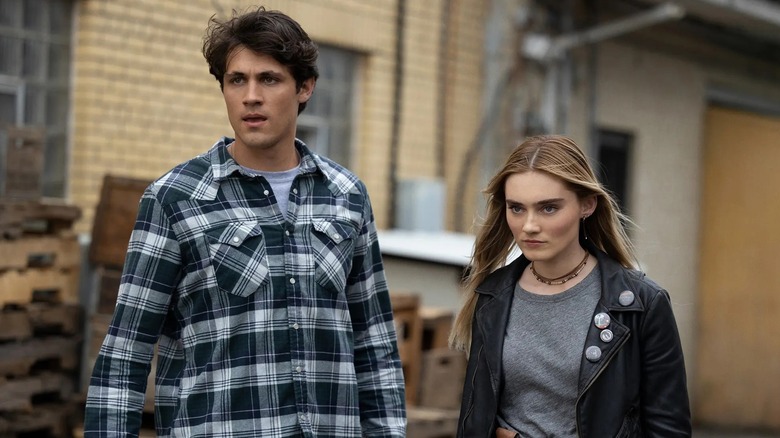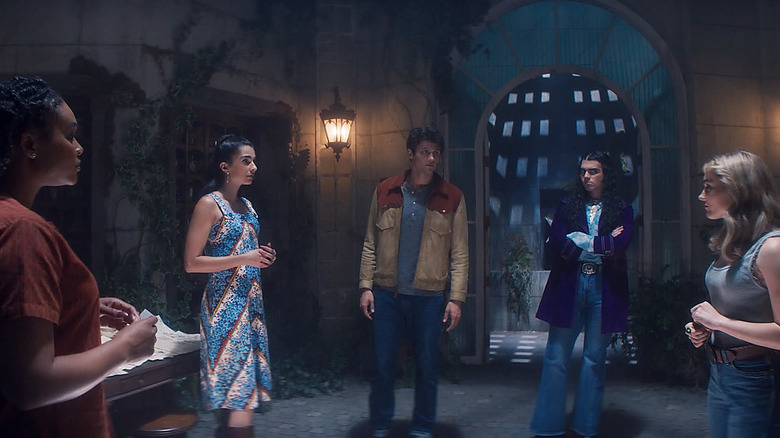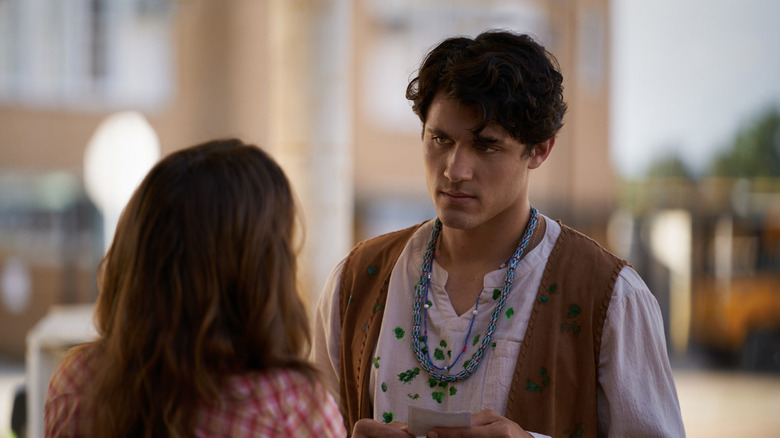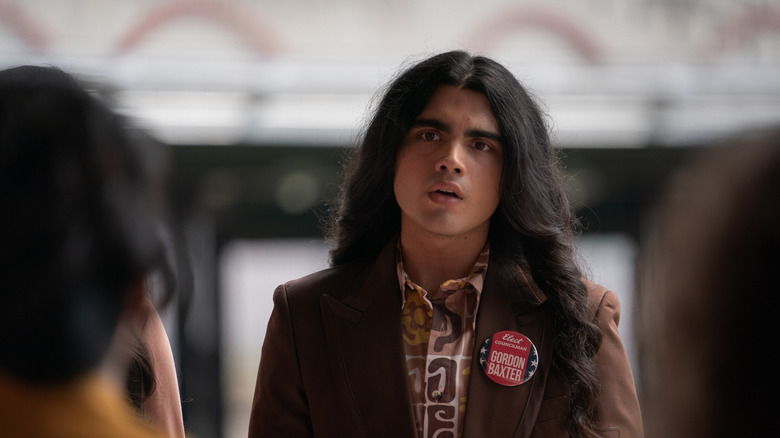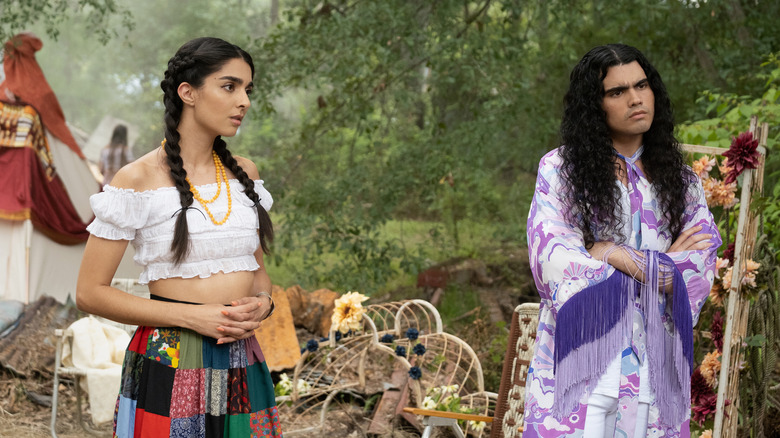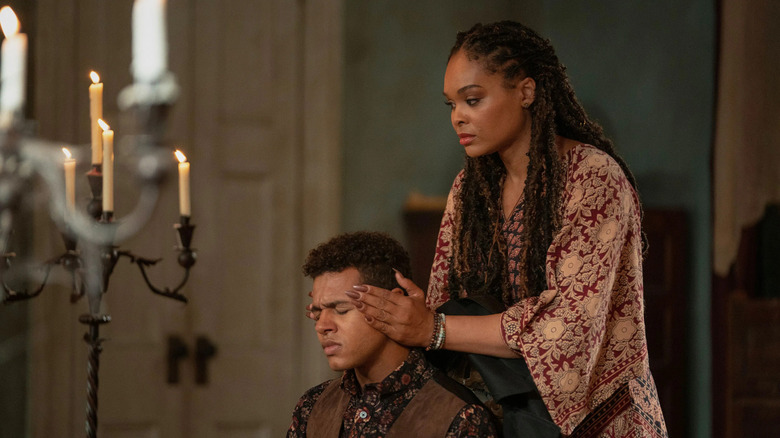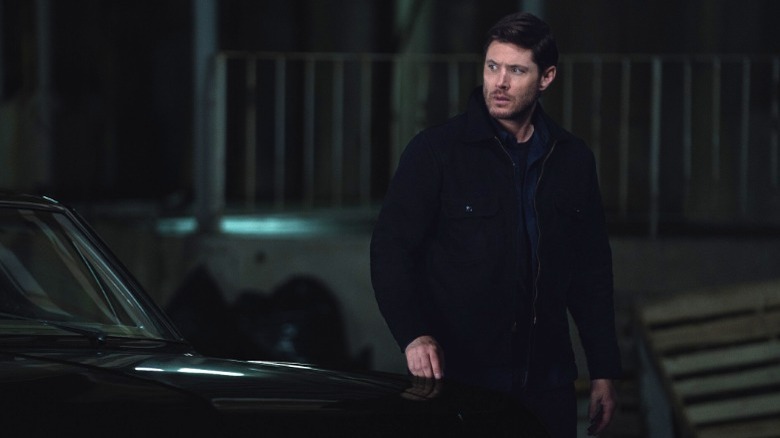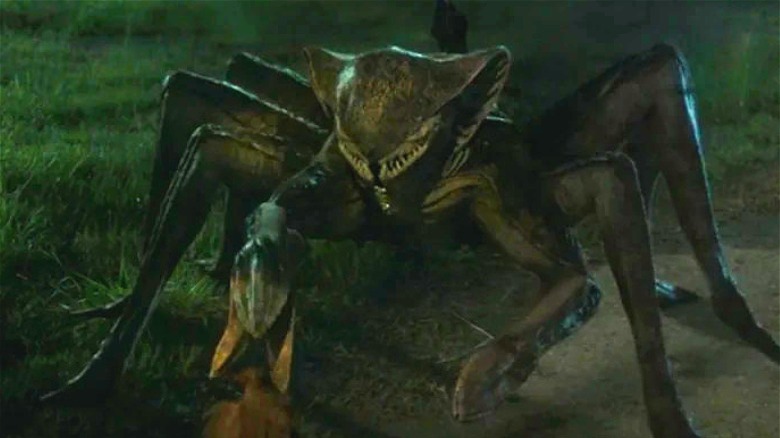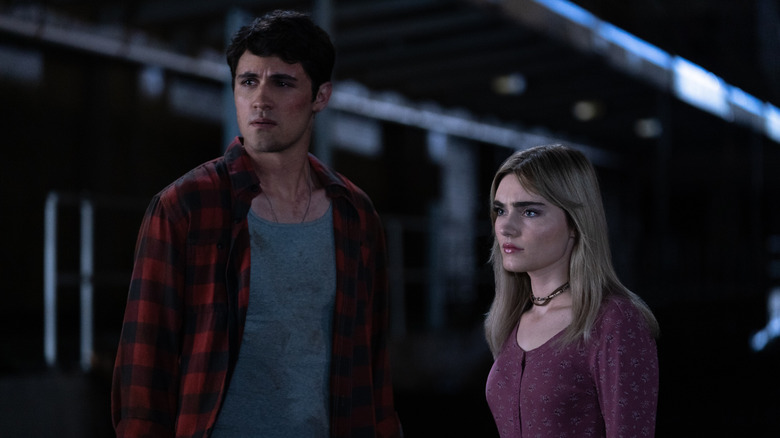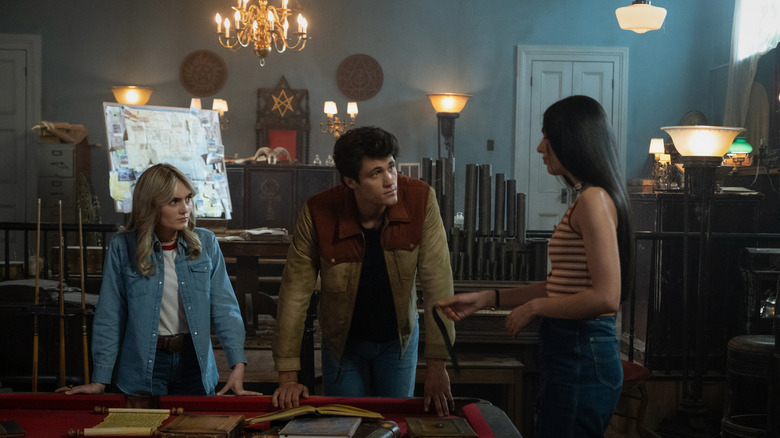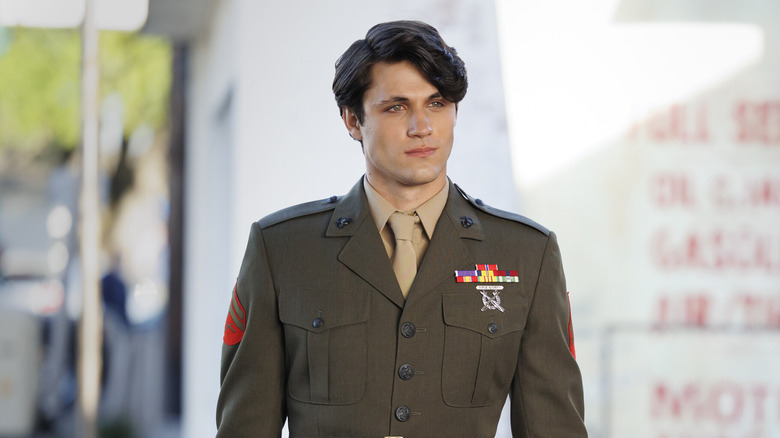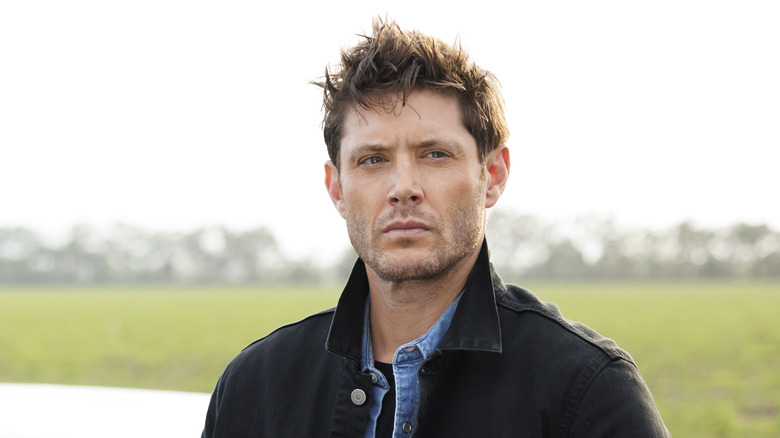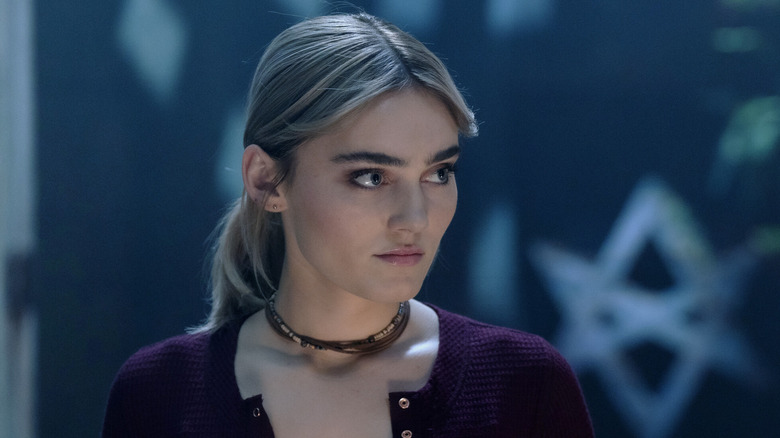The Biggest Differences Between Supernatural And The Winchesters
This article contains spoilers for "The Winchesters" Season 1.
The CW's "The Winchesters" is a prequel to its hit series "Supernatural," but it's a very different show in a number of ways. Beyond the fact that "Supernatural" chronicles the lives of Sam (Jared Padalecki) and Dean Winchester (Jensen Ackles) while "The Winchesters" tells the story of their parents, there are plenty of nuances that make each series distinct in its own right.
Fans can enjoy each series on its own or view them as an interconnected pair. Meg Donnelly and Drake Rodger lead "The Winchesters," but, unlike the original show, the series has plenty of other regulars. And, while "Supernatural" feeds into the doom and gloom aspects of the apocalypse, "The Winchesters" takes fans on a much more upbeat journey of self discovery. How else do they differ? From technical decisions to the overall vibe, here are the biggest differences between "Supernatural" and "The Winchesters."
Hunting in a pack
"Supernatural" made a name for itself by honing in on the somewhat dysfunctional and codependent relationship between the Winchester brothers. There are certainly recurring guest stars throughout the show's run, but most don't stick around for long. At the end of the day, "Supernatural" is always focused on one thing: Dean and Sam against the world. Of course, Misha Collins eventually cemented himself as a third member of Team Free Will, and his countless resurrections made him an honorary Winchester by default. Yet the focus of the OG show is still the brothers, as much as we all love Castiel.
"The Winchesters" shies away from this formula, even though the series centers around John and Mary's budding relationship. The prequel offers a more traditional group dynamic, so there's equal screen time between the leads and the secondary characters, who don't really feel secondary at all. In addition to Mary and John, Carlos (Jojo Fleites), Latika (Nida Khurshid), Millie (Bianca Kajlich), and Ada (Demetria McKinney) are integral to the plot. In many ways, this new group dynamic is a more significant change than the period setting. The whole feel of the show is more "Buffy the Vampire Slayer" and less two brothers taking on the world.
That '70s show
One of the most obvious changes between "Supernatural" and "The Winchesters" has to do with the period setting of the latter show. The original series debuted in 2005 and kept to a primarily annual timeline outside of a few time travel episodes. However, the prequel series focuses on Dean and Sam's parents, so it naturally takes place in the past. Of course, it's not the first time fans have been taken back to this point in the Winchester timeline: "Supernatural" traveled back to John and Mary's pre-children days twice, so viewers got a taste of the '70s before "The Winchesters" was even in development.
Outside of the wardrobe, one of the most significant ways "The Winchesters" hones in on the time period is the lighting. "With 'The Winchesters,' we needed [it to be] different from the blue-gray of ['Supernatural'] — it's going to have an amber feel," Ackles told TV Insider. "We're using vintage anamorphic lenses, so it's more cinematic and a different texture than we're used to seeing on the mothership." On top of that, the prequel show was shot in New Orleans, largely because much of the city's architecture remains untouched by modern upgrades. "Supernatural" was filmed in Vancouver (which the episode "The French Mistake" spoofs). With the distinct filming style and old-timey architecture, watching "The Winchesters" truly makes fans feel like they're back in the '70s.
Positive queer and diverse representation
One of the most significant criticisms of "Supernatural" is its lack of LGBTQ+ representation and diversity. Not only are there barely any recurring diverse characters, the ones we do see throughout the show — like Gordon, the vampire Alpha, Raphael, and Uriel — are all villains. We do get some positive Black characters like Agent Henrickson and Missouri Moseley, but not nearly enough for a show spanning 15 years.
Additionally, the LGBTQ+ representation on "Supernatural" is abysmal, especially during the first half of the show. Tasteless gay jokes show up more than actual queer characters, and the characters we do see are often stereotypes, like Dean and Sam cosplayers Demian and Barnes. There's a strong case that Dean struggles with bisexuality throughout the show, but the series makes little more than a joke of this. And that's not to mention the bury your gays trope — from Charlie to Castiel, queer characters don't last in this show.
"The Winchesters" rights these wrongs. Not only does the series showcase three out of six POC leads, but Carlos has a phenomenal LGBTQ+ arc. On top of being non-binary (though he goes by he/him pronouns due to the '70s time period), Carlos flirts with and dates anyone he's attracted to. He has a significant male love interest in the show, which is explored more thoroughly than any of the women he's interested in. Carlos also takes on a heap of demons by swatting them with his holy-water-filled hair, a L'Oréal-esque move that would make even Sam Winchester envious.
Peace and love
While "Supernatural" was always a fun show, it also went pretty gritty at times. The series gets progressively darker with each passing season, and it's difficult for fans to remain positive about the fate of the characters and the world at large. Dean and Sam almost give up (and even do) on more than one occasion. And beyond that aspect of the show's gloom, the brothers brutally kill (and get killed) by monsters on a regular basis. "Supernatural" goes from being a spooky series in the first couple of seasons to having more gore than a slasher series, which is impressive given its primetime TV slot.
Alternatively, "The Winchesters" adopts a much more hopeful approach, which is due, in part, to its '70s setting. The '70s were still heavily influenced by the peace and love movement of the 1960s, when many young people came together to protest the Vietnam War. The characters in "The Winchesters" do their jobs as hunters without the brutality of Sam and Dean, and the series as a whole is a lot lighter. Can you picture Sam and Dean singing "Aquarius/Let the Sunshine In" from the '60s musical "Hair" in a motel? We didn't think so.
A tolerance for good monsters
"Supernatural" establishes early on that not all monsters choose to give into their evil birthright. Still, Dean and Sam both have issues remembering this lesson throughout most of the series. In the "Supernatural" Season 1 episode "Dead Man's Blood," the Winchesters come across a vampire coven that doesn't drink human blood. Though their ringleader Eli slips up on this "vegetarian vampire" lifestyle, the vampire Lenore won fans over and is remembered as one of the best TV vampires. Eli actor Ty Olsson returned later in the show to play another vegetarian vampire who actually sticks to his murder-free lifestyle.
While Dean and Sam seem to forget that not all monsters are evil on a regular basis, characters in "The Winchesters" are much more open-minded. When Ada reveals that her son Tony is half-djinn, people are far more willing to give the kid a chance than Dean and Sam ever would be. Though Mary is a bit trigger-happy at times, it doesn't take the group very long to follow Latika's lead on letting Tony explain himself before jumping to conclusions. And she's right: Tony uses his powers to help humans and assists the group in preventing an Akrida from latching onto Mary. It's a nice change of pace from the Winchester boys' usual "shoot first" policy.
Alternate universes
One of the most significant differences between "The Winchesters" and "Supernatural" is that they take place in alternate universes. Fans guessed that this would be the case given that John and Mary's origin story in the original series is very different — mainly that John didn't know about hunting. This theory turned out to be correct, with "The Winchesters" opting for an alternate universe plotline.
Dean is determined to find a possible happy ending for at least one version of his parents. And while he's at it, the eldest Winchester brother wants to ensure that the Akrida aren't successful in their plot to destroy all universes. Sam is still living his best hunter-free life on Earth, after all. However, the logistics of how this world can be in the '70s with a new threat that puts Sam's universe at risk is unclear — as is how Jack is God in this timeline that seemingly exists in the past. But the key to time travel on TV is to avoid thinking about it too hard.
Bug-like baddies
If there's one criticism fans can genuinely make about "The Winchesters," it's that the CGI components don't necessarily stand up to the original series. Fans are used to the Big Bag taking human form most of the time — and that's even true of the Akrida in "The Winchesters" to some extent. The Akrida are far more menacing when they possess humans than when they wear their own skin. And while there are some fairly ridiculous monsters in "Supernatural" (we're looking at you, Leviathans), the ghosts and ghoulies on the show were typically designed and executed pretty well.
The bug-like true form of the Akrida leaves a lot to be desired in "The Winchesters." They look like spiders on steroids, and they are more comical than scary (or realistic). The show suffers design flaws in some other areas as well (including the demon fights). But it seems that this is the result of budget cuts and not a lack of talent involved in the show. "Supernatural" had some great special effects, but "The Winchesters" can only work with what it has been given. It doesn't detract from the show too much, but it's noticeable nonetheless.
Different actors
When The CW first announced "The Winchesters," fans weren't sure whether or not "Supernatural" actors Matt Cohen and Amy Gumenick would reprise their roles as young John and Mary. Given that the flashback episodes of "Supernatural" aired in 2008 and 2010, many assumed that the actors would be a bit too old in 2022 to play the characters again, and they were correct.
The show passed the torch to Drake Rodger and Meg Donnelly. Given that "The Winchesters" establishes an alternate universe from the original show, this casting choice doesn't detract from the prequel series. The duo looks similar enough to the original actors to make the transition seamless. However, not every casting change makes as much sense.
Tom Welling took on the role of Mary's father Samuel Campbell for "The Winchesters," which takes place only two years before the time we meet him in the "Supernatural" episode "In the Beginning." Sure, hunting isn't exactly easy on the body, but going from Welling with a full head of hair to Mitch Pileggi — as dapper as he may be — isn't necessarily believable in a two-year span.
A not-so-long way from home
"Supernatural" establishes a road trip vibe in the very first episode. Dean and Sam cruising across America in Dean's Chevy Impala to a medley of classic rock is the crux of the show. Each episode boasts a new town, a different gaudy motel, and a new threat. Sure, the boys find the Bunker in Season 8, which provides some stability. But, despite making it their home base, they stay at motels more often than not.
"The Winchesters" takes a different approach, making Lawrence, Kansas (and the Bunker) more than an occasional home base. The gang calls the Men of Letters digs the "clubhouse," and their hunts primarily stay in town. Dean and Sam rarely had to deal with their shady activities alerting the locals, whereas hunting in the same city gives "The Winchesters" group a significant amount of unwanted attention. How often can you see the same person at a crime scene before getting suspicious? Just ask John's law enforcement ex Betty.
The prequel series loses some of that "Supernatural" charm by eliminating most of the road trip elements (and the terrible motel wallpaper). Still, the show finds moments to sprinkle it in. Plus, tacky interior design peaked in the 1970s, so most houses emulate motel elements anyway.
The early John Winchester
Let's face it, John Winchester isn't winning any parenting awards in "Supernatural." At best, he's wildly negligent. At worst, he's straight up abusive. On some level, it's difficult not to empathize with the Winchester patriarch. He got dealt a rough deal watching his wife burn alive on the ceiling via Yellow Eyes, and he truly thinks he's keeping his children safe by plunging them into the hunting business. However, that belief is downright delusional. How is thrusting your kids into a world of monsters helping protect them from the very things that go bump in the night?
It's easy to see where John's coming from. But when you're raising a 4-year-old and an infant as a single father, it's time to get some therapy and deal with your revenge fantasies without dragging your kids along for the ride. Though we learn that it's a different universe in "The Winchesters," the prequel series lends some insight into why John is the way he is — and how things could have turned out differently in "Supernatural" if John actually dealt with some of his war-related trauma.
John has a heartbreaking scene with his mom early in the show, putting the devastating nature of his PTSD in the spotlight. With that context, it's obvious how hunting would send John right back to that war mentality, and how, without a support system, he would get lost in it. However, "The Winchesters" shows just what kind of person John could have been if he didn't shut everyone out in "Supernatural," and it's gut-wrenching.
A mini-series
Before the world of streaming took over TV, the magic episode number for TV shows tended to be around 22. "Supernatural" generally stayed in line with that norm until Season 7, when the show got a 23rd episode. The episode count stayed at 23 before Season 14 ended on episode 20, which was also the final tally for the show's 15th and final season.
"The Winchesters" ended its first season on 13 episodes — just three less than Season 3 of "Supernatural," which was a victim of the 2007-2008 writer's strike. The creators of "The Winchesters" were hoping for a backorder of episodes following the first few installments of the series, but The CW was on a cancelation spree right before the prequel series aired, so extra episodes were always unlikely. As revealed by Deadline, Nexstar (the new owners of The CW) opted against more episodes despite ratings being good.
With so much lore, backstory, and plot points to cover in "The Winchesters," those extra episodes are sorely missed. The series gets into a few fun filler episodes, but with a limited episode count, the main plot points could have used some of that runtime. The Dean mystery feels rushed, and the season's overall arc could have benefited from more screen time.
A not-so-significant death toll
One thing that sets "Supernatural" apart from most other TV shows isn't necessarily the monsters, the family focus, or the Impala — it's the death toll. No one lasts very long in "Supernatural." Sure, the series found clever ways to bring actors back for cameos throughout its run, but neither the Winchester brothers' allies nor their foes live long lives. A prime example of this is at the end of Season 2 when Ash and the Roadhouse burn to the ground as a direct result of their affiliation with the Winchesters. We also learn that John is the reason Ellen's husband died — and Ellen and Jo meet a grisly end a few seasons later.
Other casualties in the Winchester family war include a young Kevin, everyone's favorite hacker Charlie, and longtime pal Bobby, to name but a few. Of course, the Winchester brothers and their angel sidekick Castiel die quite a few times themselves, but the core three almost always make it back from the dead. However, "The Winchesters" takes a sharp turn from this trope. Not only do none of the main characters in the prequel series perish (not yet, anyway), but even minor characters manage to live. In fact, no one we care about at all bites the dust in Season 1. The finale ends on a happy and hopeful note — a vibe that couldn't be more different from its parent series.
